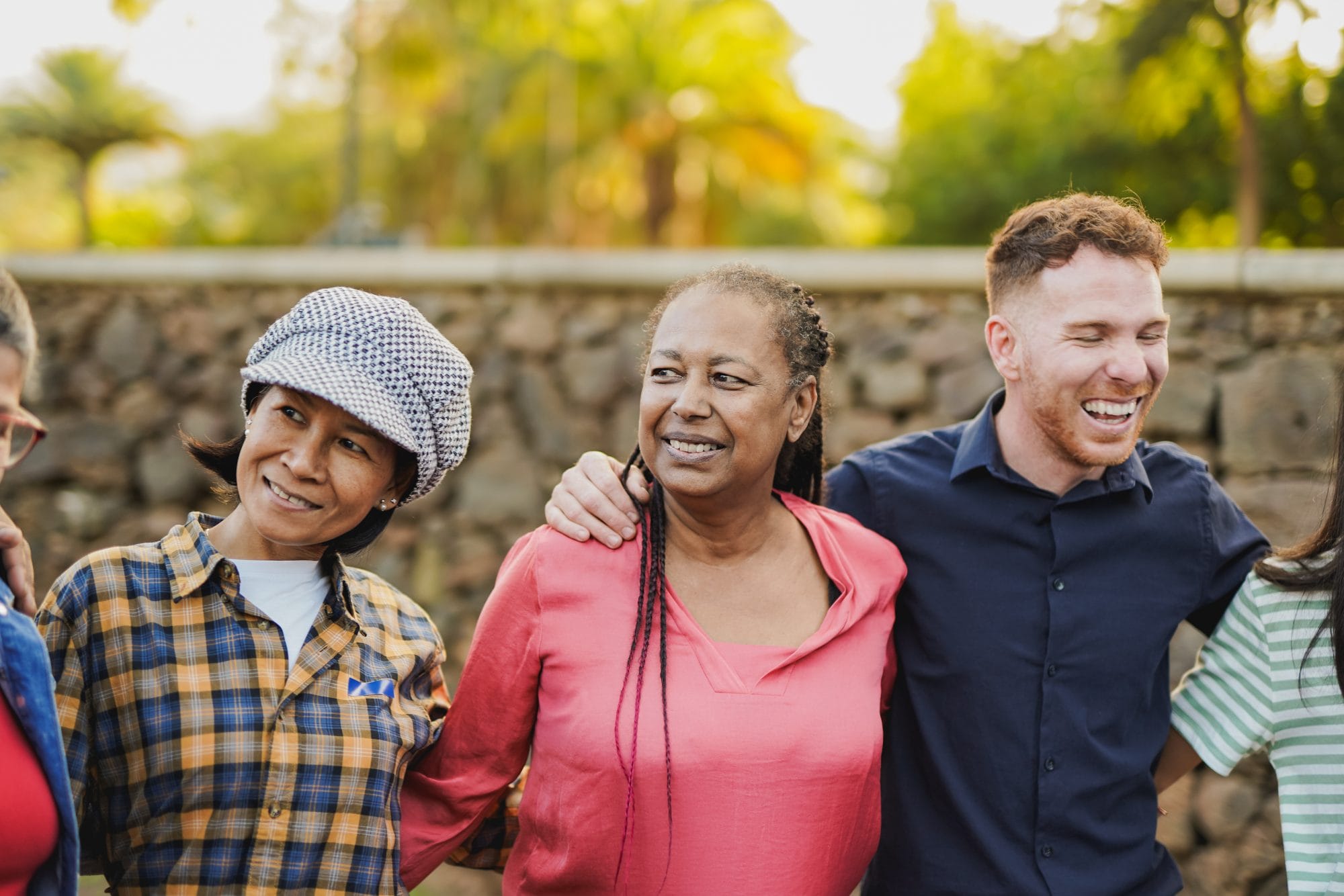The Very Good in a Flourishing Community
I (Ray) recently attended a watch party with leaders in Central Arkansas for the Global Leadership Summit (GLS). Every year, GLS brings in premier voices from across the leadership spectrum, including CEOs, entrepreneurs, authors, psychologists, and pastors. When leaders from the watch party were asked which talk was most influential, almost every leader gave the same response – Liz Bohannon, Co-Founder and Co-CEO of Sseko Designs.
After an engaging and humorous introduction, Bohannon told the audience and leaders watching around the world, “Today I want to talk about something that will be hard for many. It’s something that, according to the Surgeon General of the United States, is more dangerous than heart disease, cancer, and smoking fifteen cigarettes a day. I want to talk about the epidemic of…loneliness.”
The Epidemic of Loneliness
How dangerous is loneliness? According to a report (“Our Epidemic of Loneliness and Isolation”) from the Surgeon General, even before the COVID-19 pandemic, about half of U.S. adults reported experiencing measurable levels of loneliness. The report warns about the physical consequences of loneliness, which include: a 29% increased risk of heart disease, a 32% increased risk of stroke, and a 50% increased risk of developing dementia for older adults
The Surgeon General, Dr. Vivek Murthy, has this to say about the epidemic:
It’s hard to put a price tag on the amount of human suffering that people are experiencing right now. In the last few decades, we’ve just lived through a dramatic pace of change. We move more, we change jobs more often, we are living with technology that has profoundly changed how we interact with each other and how we talk to each other. And you can feel lonely even if you have a lot of people around you, because loneliness is about the quality of your connections.
As we watched Bohannon’s talk, you could have knocked us over with a feather as each of us began to understand that we are living in a culture designed for loneliness. We hung on her every word as she told us that:
- Loneliness is the painful psychological state that arises when we don’t have the intimate, connected relationships and support systems that we need to thrive.
- You are not alone in feeling alone.
- Your loneliness is not an accusation of your unworthiness. It is a signal.
- It is less about you as an individual and more about the fact that we are building a culture designed for loneliness.
- We are designing a culture with a primary value of convenience and independence.
Bohannon did more than just connect with the audience that day through humor, make a compelling argument using data, or wow us with oratory prowess. She tapped into something deep inside; she captured our hearts with something that is true of all of us—it is not good for us to be alone. When we are, it creates a problem that is potentially lethal.
Truly Human
Recently, we published an article about Endgame: The Church’s Strategic Move to Save Faith and Family in America by J.P. De Gance and John Van Epp. In the book, the authors agree with Bohannon and connect the epidemic of loneliness to the historic decline and fracturing of marriage and family in the United States. “The deterioration of relationship health has included historic increases in loneliness, depression, and anxiety, as well as a sharp decrease in meaningfully close friends or family.” What does this tell us? It tells us that human beings are made for relationships. And we are not truly human without relational connection with others, whether it’s with our spouse…with our kids…with our family…with friends…and with God.
In Part 2 of our Flourishing Series, we want to explore the first of the six domains of biblical flourishing from Amy L. Sherman’s book, Agents of Flourishing: Pursuing Shalom in Every Corner of Society. The Good is the realm of social mores and ethics, which includes marriages, families, religious and nonprofit organizations, social service programs, philanthropic foundations, and schools. What do all of these have in common? They all exist in relationships.

Made for Relationships, Made for Flourishing
After every stage of God’s creation of the heavens and the earth, he called it “good.” The pinnacle of his creation came when he created man and woman in his image and told them to be fruitful and multiply. In Genesis 2, we get a closer look at the creation of the first family and discover that something wasn’t good in God’s good creation. God created Adam first and placed him in the garden. But there was a problem. Adam was alone. God observed this and said, “It is not good that the man should be alone; I will make him a helper fit for him” (Genesis 2:18).
God is personal and exists in relationship. The Father, Son, and Holy Spirit enjoy relational connection and intimacy with one another, and that was something God wanted to share with humans. God has always been about a family, and so it is no wonder that after he created the first family, he called it “very good.”
We were made to image God in intimate, connected relationships and support systems. Only by being connected in relationship to God and others can we experience life as it was meant to be lived – in flourishing relationships and community with God and others. Only through flourishing relationships, marriages, and families can we solve the epidemic of loneliness that many suffer from today in our country and enjoy the life God wants for us.
Sticky Churches
God designed marriage and the family to be foundational for flourishing, because through them we image the kind of relationship the Father, Son, and Spirit have with one another – personal, connected, intimate, supportive, and serving. The key to building these kinds of relationships is the church. Here’s how Sherman explains the importance of churches to flourishing relationships (specifically marriages) in Agents of Flourishing:
Why churches? Churches aren’t the only ones trying to strengthen marriages. A variety of secular nonprofts work at this too, some with government funding. But churches bring some unique assets to the table. […] Churches are “sticky in a way that nobody else is sticky,” explains [J.P.] De Gance. A person attending a church program about marriage could be invited over by a congregant for a meal, asked to join another couple at a Sunday service, or welcomed into a small group. Congregations, he says, are eager to help people connect. At churches, “You’ve got a deep reservoir of your membership passionate about forming one-to-one, life-changing relationships, which produces the stickiness that churches have over other NGOs,” De Gance explains.
John Stonestreet of the Colson Center agrees. Churches are “scattered, de-centralized, and localized” social institutions, he notes. They are positioned to identify and connect with specific couples that are struggling in their marriages.
Religious communities provide couples with a beautiful vision about what marriage can and should be. They support couples in their relationships and teach and encourage healthy marriage skills. Congregations can also be placed where younger married couples rub shoulders with older ones. This provides access to mentoring for younger adults by more experienced couples.

Flourishing Relationships
At CityChurch Network, we’re helping churches respond to the epidemic of loneliness to build strong marriages, healthy families, and flourishing futures for youth in our city. We do this through church/school partnerships, after-school tutoring and mentoring programs, foster care and adoption ministry, and our partnership with the Central Arkansas Marriage Initiative. We are also developing partnerships and programs to help people of all ages live in healthy relationships and understand biblical manhood, womanhood, marriage, and family.
We do all of these things in partnerships (and relationships) with local churches to ensure that, in our community, there are:
- Flourishing relationships
- Flourishing marriages
- Flourishing families
- Flourishing futures for youth
Hope Dealers
At the end of Liz Bohannon’s talk, she encouraged everyone to be a “hope dealer.” Here’s how she explained that concept: “My darkest night might be in the middle of your day when you have hope that I can borrow until sunrise. Whatever challenges you have, it’s too much to carry on your own.”
We need each other. We need one another to overcome the epidemic of loneliness. We need relationships and intimate connections with God and others that reflect God’s image and what is “very good” about his creation. We need strong marriages and families in order to have strong communities that flourish. We need churches across the neighborhoods and differences in our city to be “hope dealers.” To be the ones who let the light of Christ shine brightly with the hope that individuals, couples, families, and entire communities can have the relationships and flourishing God created for them to enjoy.
It is not good to be alone. We are better together. Together we can build a flourishing community, and that is very good.


